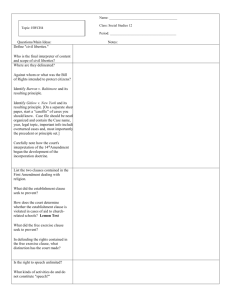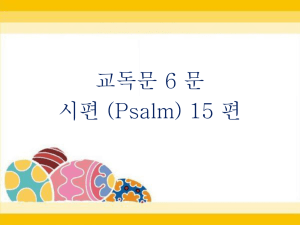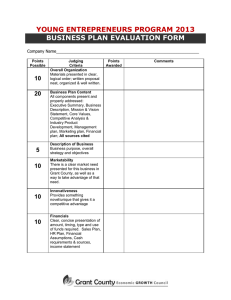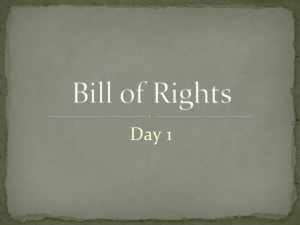16 James 4v11-12 Judging One Another
advertisement
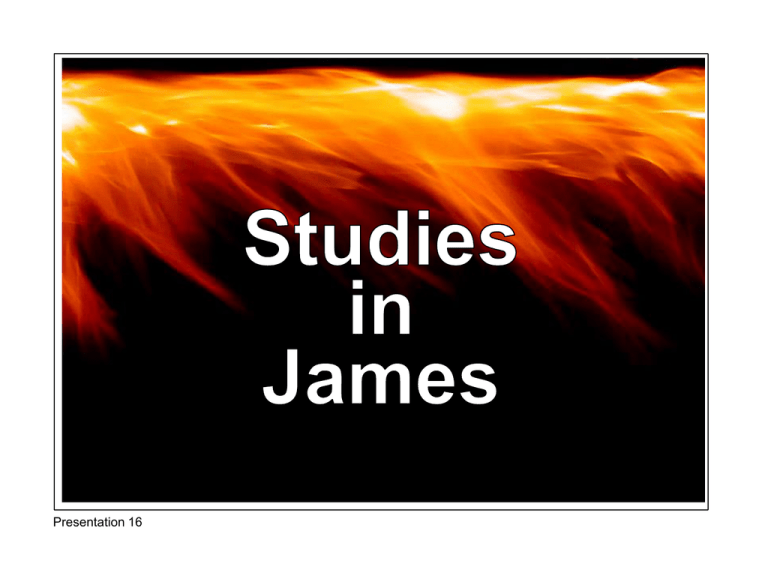
Presentation 16 The Structure of the Book Introduction and Trials in the Christian Life (1: 1-8) Happiness in our Circumstances(1: 9-11) Trial, Temptation and Gift (1: 12-18) Hindrances to Fruitfulness(1: 19-21) Doers and Hearers (1: 22-25) True Religion (1: 26-27) Favouritism (2: 1-7) The Royal Law (2: 8-12a) Showing Mercy (2.12b-13] Faith and Works (2:14-26) Teachers and the Tongue (3: 1-12) True and False Wisdom, (3: 13-17) Peacemakers (3: 18) Defeat Through Lack of Submission(4: 1-6) Victory Through Submission(4: 7—10) Judging One Another (4: 11-12) Boasting of Tomorrow (4: 13-17) The Misuse of Wealth(5: 1-6) The Need of Patience (5: 7-12) Appropriate Responses (5:13-16) Restoring the Wanderer (5:17-20) Presentation 16 Presentation 16 Introduction James turns our attention to how we speak about one another. “Brothers do not slander one another”. To call them ‘brothers’ is a reminder of the family bonds that exist within the church. In ordinary family life its members to stick together and defend one another from the criticism heaped on them by outsiders. This caring family solidarity should also be true of church members. Christians should expect slander from outside the church (1Pet.2v12), but the problem James identifies is, that instead of supporting one another, church members were engaged in internal character assassination. Presentation 16 Introduction The Greek word katalaleo translated as ‘slander’ has a wider meaning. Slander means: “a false tale or report maliciously uttered, designed to injure the reputation of another by lessening him in esteem of his fellows, by exposing him to impeachment and punishment, or by impairing his means of living”. The word ‘slander’ is used 5 times in the NT and 3 times in this verse. The verb tense used is an active imperative, stressing that slander is an action we must constantly avoid. Slander is often motivated by envy, a chief characteristic of ‘Satan,’ [whose name means ‘slanderer’ Rev. 12:10], who envied God. Note that the first temptation put to Eve, slandered and misrepresented God. Gen 3v1-5 Presentation 16 The Impact of Slander James is dealing here with something that strikes at people’s dignity, defames their character and destroys their reputation. Significantly, the OT denounces the sin of slandering God or men more often than it does about any other sin. In Lev 19v16 God says “You shall not go about as a slanderer among your people”. It was an identifying mark of the godly that they did not slander while it was a mark of the ungodly that they slandered. In NT the slanderer is regularly and publicly condemned. Jesus identified its source as an ‘evil heart’ and taught that it defiles a person (Matt 15v19-20). Presentation 16 The Impact of Slander An illustration of the disaster that slander causes is found in 1Sam 10. David chose to act kindly towards the son of the Ammonite king. However, this son’s advisers poisoned his mind with slander concerning David. David’s envoy was publicly humiliated and the Ammonites hired mercenaries in preparation for war. David upon hearing of this mobilisation of armed forces, moved against the Ammonites in battle. The result was over 40,000 dead and many cities destroyed. All of this resulted from the words of Slanderous advisors who had bad mouthed David and his motives. (1Sam 10v3). Presentation 16 The Impact of Slander To speak against a brother is to ‘judge him’. The Greek word ‘krino’ translated as ‘judges’ does not refer to the act of evaluating or assessing someone, but rather to condemning someone. It is an envious, censorious spirit that is quick to point out the faults of others in respect of their real or imagined failures. It is being judgmental and eager to publish his views by whatever means possible. Presentation 16 The Impact of Slander Gordon MacDonald the Christian author describes a visit made to Japan. He and his companion began to speak of a mutual friend. Gordon spoke unkindly of this friend. His companion stopped him, looked him in the eye and said, "Gordon, a man who says he loves God would not say a thing like that about a friend.” Those words of rebuke have subsequently sealed his lips when tempted to say something unkind about a brother or sister. We need friends lovingly and graciously to tell us when we begin to slander others and we need to receive with deep gratitude their words of rebuke. Presentation 16 Two Types of Judging The Bible speaks of two different kinds of judgment. The judgment James says we are to avoid is when we assume we can do God’s job better than him. Jesus said, "Do not judge, or you too will be judged” Matt7v1. These words are often misunderstood. Tolstoy thought we were being told to reject the whole judicial process. Others think Jesus wants us to suspend all of our critical faculties thereby refusing to distinguish between good and evil behaviour. And so these words are used to defend or even justify sinful behaviour. For example, suppose you rebuke someone who is having an adulterous affair. That person may say “Do not judge, or you too will be judged”, and then add “Who do you think you are to judge me?” Presentation 16 Two Types of Judging What do Jesus’ words mean? Quite simply we are forbidden to play God and pass final judgement on another. God is the only competent authority to judge. We dare not put ourselves his place for we do not possess all the facts to judge another. We cannot read men’s hearts or assess their motives. Only God can! The censorious critic judges harshly. He is a faultfinder, who tends to be negative and destructive in his criticisms. He puts the worst possible construction on the motives of others. We are not told to sweep the sin of others under the carpet nor are we asked to suspend our critical powers but to show generosity towards the sinner. Presentation 16 Two Types of Judging Nor is James talking about the judging that comes as a result of confronting of sin; Scripture commands us to do so. (Matt. 18:15-17; Acts 20:31; 1 Cor. 4:14; Col. 1:28; Tit. 1:3; 2:15; 3:10). Nor is James forbidding the right of the Christian church to exclude from its fellowship those it deems to be in flagrant disobedience to the standards of the faith, or to determine right and wrong among its members (1 Cor. 5 and 6). Instead, James is talking about speaking evil against our brothers and sisters. Presentation 16 Two Types of Judging This kind of evil speech can take many forms, such as: gossip, improper criticism, false accusations, and censorious speech by which we condemn others as being wrong in the sight of God. Indeed, slander is a means of committing murder against a person, as it involves tearing down a person's character and reputation in the eyes of others. This may have been the "murder" that is spoken of in v2. Slander can lead to murder, whether it be physical or verbal. Scripture has much to say on this subject: Ex. 23:1; Ps. 50:20; Rom. 1:29; 2 Cor. 12:20; Eph. 4:3; 2 Tim 3:3. Presentation 16 Two Types of Judging When the two types of judgment are confused people are reluctant to speak out against what is wrong lest they be accused of judging others. When we are determined to see everyone as a ‘nice’ person we are being unrealistic. The difference between wise and evil judgment is the motive behind it. What James is exposing is the harsh and uncharitable man who is always finding fault with others. What is the slander’s motive? Often people want to point the searchlight at their faults so that they might deflect it from their own. It is a way of covering up their own sin and spiritual barrenness. Presentation 16 Two Types of Judging We read in Gal. 6. 1ff: ‘Brothers, if someone is caught in a sin, you who are spiritual should restore him gently. But watch yourself, or you also may be tempted. Carry each other's burdens, and in this way you will fulfil the law of Christ’. The word translated ‘restore’ was used in antiquity for setting a broken bone. And so, we are to deal with the faults of others with the care of a medical practitioner. In contrast with the harsh, censorious, spirit of the slanderer. If we have experienced corrective soul surgery and know its pain we will surely be kind in our correction of others. Some say, ‘I care for my friends too much to confront them with their sin.’ But is that care or cowardice? To leave the sin in place, is inconsistent with brotherly love. Presentation 16 Judging God’s Law We learn from v11 that the slanderer is guilty of speaking against and judging the Law of God. What does this mean? It means that this person is so blinkered in his determination to commit verbal murder that he no longer takes into account the Law of God. The law teaches us to love our neighbour just as we love ourselves (Mark 12:31). Since loving is the fulfilment of the Law (Rom 13v8) slander constitute a failure to love others and is then a breach of the Law. If we slander our brother, then we are ignoring the command to love one another, thus judging the law. Presentation 16 Judging God’s Law In what way is such a person judging the law? We are saying that the laws of God are not adequate and we know better. We are either above the law or subject to it; and by disobeying it, we are telling ourselves and God that we are above it. God gave his law to regulate people’s love towards him and others. Therefore slander is a violation of this Law. It shows utter disregard for the divine standard because the slanderer places himself above God’s Law. By doing so he is making himself its Judge. To gain victory over slander requires us to take our proper place which is under the law’s authority. Presentation 16 Only One Lawgiver It is clear from v 12 that there is only one Lawgiver and Judge, God Himself. What does that mean? It means that God is the only one that is not subject to the Law because He is the creator of it. No one else in the universe is able to make this claim, not even the angels in heaven. As a result of his status as Lawgiver and Judge, God is the only one who is able to determine the eternal state of men, and women whether heaven or hell. Presentation 16 Only One Lawgiver God is also the only qualified Judge because only he alone is in full possession of the facts about our lives. Only he can read the thoughts of a man’s mind and the intent of his heart. We do not have the qualifications to be judges in any absolute sense. Our assessment of others can only ever be provisional – we do not have God’s knowledge of the Human heart. It is not our place to play God in the lives of others. By judging, we are assuming to ourselves God’s sovereign role with our extremely limited insights and lack of understanding, mercy, or the ability to chastise or judge righteously. Presentation 16 Only One Lawgiver Since God is the only Lawgiver, the slanderer also attempts to place himself above the only true Lawgiver and Judge. This desire to usurp the place of God and grasp his throne has been the essence of every sin committed from the time of Adam. The slanderer has an exaggerated view of his own importance v12b. This is the opposite of the humility that should be ours as children of God. The chief characteristic of a Christian should be humility! It is pride that persuades us that we can judge others effectively and better than God. Those who habitually engage in slanderous behaviour cast doubt on the genuineness of their faith. Presentation 16 Only One Lawgiver Our critical behaviour can disguise itself as well intentioned kindness. ‘Let me help you with this speck in your eye’ [Matt.7.4]. To exalt ourselves by disparaging others is a very cheap way of claiming moral superiority… ‘Lord I thank you that I am not as other men...’ Lk.18v11. The least we should do is apply to ourselves the same strict standard that we apply to others. ‘But if we judged ourselves, we would not come under judgement.’ 1Cor 11.31 Presentation 16 Conclusion When we judge others we are saying I am a better judge than God! Clearly we are unfit to be judges, not simply because we are fallible human beings who do not possess all the facts but because we are fallen human beings who often view things with a very distorted perspective. Presentation 16
